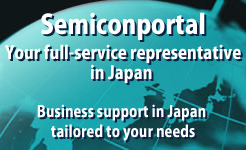Discontinuation of certain ASICs will help bottom line, but auto sector untouched
Japanese chipmakers have been manufacturing some products for more than two decades. This prompted an executive of Massachusetts-based aftermarket manufacturer Rochester Electronics to comment that the Japanese semiconductor industry seems to have no policies on discontinuing production of obsolete devices. Though his comment contains more than a grain of truth, Japan's chipmakers are reviewing their business practices and have started winnowing their product portfolios.
Chipmakers such as Renesas are moving to pull the plug on production of certain semiconductors and LSIs as one aspect of their restructuring. The movement, however, gives industrial system vendors and other users a headache. Even so, devices for industry applications that don't make the cut are being dropped, but the automotive sector, the most important and the biggest application field, appears to be a sanctuary.
Chipmakers' primary objective in ceasing production of certain products is improved profitability. Japan's semiconductor manufacturers have been satisfying their customers with custom products such as ASICs. Since economies of scale are important in the semiconductor business, manufacturing diverse products in small quantities puts manufacturers at a disadvantage in terms of financial performance, which can prove fatal. This has been cited as the main reason for the low profitability of Japanese chipmakers.
Renesas' recent move is conspicuous. The company has not disclosed how many products are to be discontinued, but it is expected to be several hundred and could be more than a thousand.
Last fiscal year, Renesas upped manufacturing volumes of products slated for discontinuation. The company concluded a contract last February with Rochester Electronics covering inventory control and wholesaling services for these products. Renesas customers wishing to purchase discontinued products will do so from Rochester from now on.
Some discontinued products, however, were not manufactured in advance for inventory. In this case, customers often feel compelled to purchase the items before production ceases. These customers have a headache because purchasing the chips in volume lowers cash flow and it is difficult to foresee demand over the long term.
Hence, the growing interest in LSI emulation services that recreate LSIs such as ASICs from mask data and through reverse engineering.
Toshiba Information Services, which is vigorously promoting its LSI emulation service, said it has received more than 20 orders for IC emulation so far this fiscal year and has high hopes of capturing plenty of orders next fiscal year.
By winnowing their product portfolios through ceasing production of certain products, Japan's IC manufacturers are expected to improve their financial performance. However, there is criticism that this zealous pursuit of reform does not apply to the automotive sector, the biggest user of custom chips.
The automotive sector, with its numerous applications, has a huge appetite for IC products of every shape and description. But Renesas, for example, appears not to be laying a finger on that field. Industry watchers observe that as Japan's major carmakers together with the Innovation Network Corp. of Japan (INCJ) invested in Renesas, the company is not in a position to wield the knife in the automotive arena—that is, to discontinue production of certain items.
Whether Japan's automakers are willing to accept that certain chips will no longer be produced may have a big impact on the regeneration of Japan's semiconductor industry.
The original article in Japanese by Masami Inaba appeared in the July 9 issue of The Semiconductor Industry News. Edited and translated by EmergingTech.
Warning: Invalid argument supplied for foreach() in /home2/semicon/hosting/spiwww/include/Banner.php on line 78
Warning: array_multisort(): Argument #1 is expected to be an array or a sort flag in /home2/semicon/hosting/spiwww/include/Banner.php on line 81
Warning: Invalid argument supplied for foreach() in /home2/semicon/hosting/spiwww/include/Banner.php on line 85



